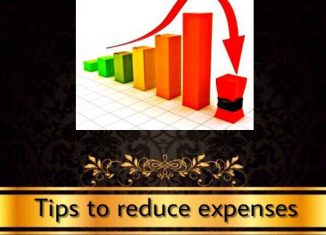
On your path to financial freedom, you’ll need your revenue to surpass your expenses.
Anyway, reducing costs is essential to consider because having money saved will help you in case of emergencies like accidents, fines or any kind of unexpected costs. In general, cutting expenses is important so you can live without worries.
The types of expenses and ways to reduce them is what I’m going to explain in this article, so if you want to change your money habits for the better continue reading 🙂
.
Fixed expenses
These kind of expenses are the most difficult cut down because they’re fundamental. They occur regularly, don’t change from month to month and are necessary for day-to-day living.
Some examples of fixed expenses are mortgage/rent, utilities, health insurance, car insurance, life insurance…
Ways to reduce fixed expenses
- Compare gas and electricity prices. Get to know if you’re getting the best deal with your gas and electricity by checking out online comparison sites.
- Reduce your insurance bills. Compare prices to make sure you’re getting the best deal for the least amount of money no matter if it’s health, life, car or travel insurance. You also need to remember that the cheapest doesn’t always mean it’s the best.
- Turn the lights off. Consider turning the lights off when you leave a room, it will cut expenses on your electricity bills. You can also place little stickers by the switch to help you not forget about it.

- Install a programmable thermostat. A programmable thermostat will make you save on your heating and cooling bills because it enables you to automatically change the heating and cooling of your home when you’re asleep, when you’re out…
- Unplug all unused electronic devices. Don’t you think a big amount of energy could be saved if you switched off those electronic devices that you rarely use? Take this into account.
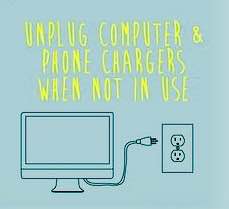
- Re-evaluate your utilities. One way to keep your utilitiy costs down is by opting for fans instead of air conditioning. You can also call your cable and Internet providers to negotiate a lower bill, or in case you live in an apartment block, maybe you can share your Internet connection with those around you.
.
Periodic expenses
Periodic expenses are similar to fixed expenses but the difference is that they’re paid every certain period of time (every semester, once a year…). These are the trickiest expenses to plan for because they don’t occur every month so it’s easy to forget about these costs.
Repairs/maintenance costs for your home and automobile, birthday gifts, back to school costs, tag renewals, medical expenses and memberships fees fall into this category.
Ways to reduce periodic expenses
- Determine how much you spent last year for periodic expenses. This is a way to have an idea of the amount that you will spend this year.
- Open a savings account. When you know how much you will need to spend on periodic expenses during the year, divide the total amount by 12 and then save that amount each month.
- Review all your memberships and subscriptions. If you get a magazine or a newspaper in the mail but simply don’t read it, then cancel that subscription. Or perhaps you’re using a gym membership only once a month when you could go jogging for free. Determine if paying for all your memberships and subscriptions is truly worth it.
- Make your own gifts. Be creative and spend more time making your own cards and presents instead of buying expensive gifts for people. Don’t you agree that the gift of time is more valuable than the gift of money?

.
Variable expenses
These type of expenses change from month to month, so they are not that difficult to be reduced and you have more control over the amount spent. You can plan for them by examining your spending over a period of time like a week and creating an average for each category.
Food, clothes, entertainment and transportation costs are examples of variable expenses.
Ways to reduce variable expenses
- Use public transportation or walk. Public transportation can save you quite a bit of money on gas, parking, and maintenance over time. You should also consider walking whenever you can, especially if the place you need to go is near you. Each time you’re able to leave the car behind, you’ll be saving money.
- Spend less in gasoline. Every time you get in your car, ask yourself “Is this trip necessary?”. Avoid going for a drive for pleasure, try to exercise or use other forms of entertainment instead.
- Share car rides. See if there are any other people who live near you so you can share journeys and reduce your costs on gas. It’ll pay off in the long term.

- Look for cheap entertainment options. Your community may offer plenty of options for inexpensive or free entertainment of all kinds. For example, you can attend local events like music festivals, take advantage of the local library, or even join volunteer groups and organizations.
- Unsubscribe to email deals and sale alerts. Cancel your subscription to daily deal emails and other sale announcements so you don’t do unnecessary shopping.
- Clip coupons and compare prices. Make sure these are on items you would normally eat so you do not buy food that will be wasted. Use store customer cards when possible toward food purchases. In case couponing is not for you, spend some time researching where you can get the most of your money.
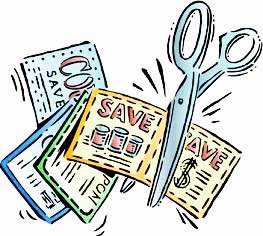
- Cook and pack your own meals. When you cook at home, make a lot of different dishes to prepare you for the whole week and then put them in the freezer. Then, bring one dish to work every day instead of eating out.
- Make a shopping list and stick to it. This will help you as a reminder of what you need and will also prevent you from making unnecessary purchases.
- Reduce or stop eating out. Going to eat at a restaurant can be a nice luxury and can save you a lot of time, but the expense can be enormous.
- Consider thrift stores. Whenever you’re looking to update your wardrobe or buy new things for your home, thrift stores are a good alternative to find cheap stuff.
- Quit smoking. Smoking is a huge waste of money, not only because of the $100 or $150 you spend per month. Apart from it, there are enormous added costs to your health and life.

- Limit or quit drugs and alcohol. Consuming drugs and alcohol is illegal and can have terrible consequences, they decrease productivity, cause health problems, they’re expensive… Similar to smoking.
.
More tips
- Write down all your expenses. Pick a notebook and write down the amount of money you spend and where you spend it every certain period of time (every day, every week or every month) and then you will see where to cut costs.
- Save before you spend. Think about the long-term benefits of reducing your spending instead of rushing to the store to buy something you don’t need.
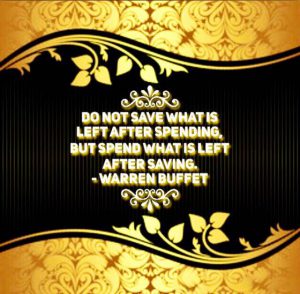
- Think before making a purchase. Ask yourself “Do I really need this item?” and if the answer is “no” then it means that it’s a want (not a need), so it can be avoided.
- Stop gambling. Unless you’re making money, you should stop gambling. It can be a big money waster.
- Move to a less expensive area. This would be a good idea if you’re looking for a job. You can look around at other areas of the country where you can find employment, see what your salary would be there and then look at the housing costs.
- Throw your loose change into a jar. At the end of each month count it up and see how much money you’ve saved. You will be surprised at how much you’ll have in the long run.
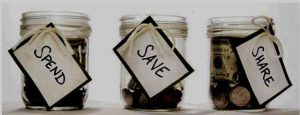
- Try to pay for things with cash only. Allow yourself a certain amount of money each week and don’t spend more than that. Try to pay with cash instead of your credit cards (unless you’re making an online purchase) because it will be easier for you to keep up to date with what you’ve spent.
.
That’s it for today! Are you already putting any of the tips I mentioned into practise? What would you add to the list? Thanks for dropping by and please feel free to leave a comment below! It will be a pleasure to connect with you 🙂

.
.
.
.

